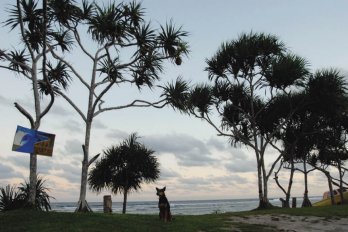There’s no escaping anything in life. Fly all the way to Tahiti or the Himalayas, and what you’ll find—as the Hollywood clichés often remind us—is that person who’s always longing to escape. At peace for a while, but only in the way of someone who has taken a painkiller for the growing cancer in his stomach. Or run out of a relationship, and where are you but in a state in which you long to run into another relationship from which to run out of again? The only way we change our circumstances (and, yes, I know this is the message of every Hollywood romantic comedy, too) is by living inside them and changing our minds, deepening and refining the very notion of escape until, perhaps, it explodes.
When I was in my twenties, I thought I had everything I could want in life: a fun job writing on world affairs for Time magazine, a chance to take my holidays in Burma and El Salvador and Tibet, free time over the weekends to write from the heart for the more radical magazines (the Village Voice, The Nation) I’d grown up on. No cares in the world and an apartment that (officially, at least) was on Park Avenue. Even my landlady’s name, as if sent from screenwriter’s heaven, was Aida Descartes. Melody chiming with philosophy.
And so I left. Not because I wasn’t comfortable, fulfilled, and happy, but precisely because I was. And so, I thought, I might easily drift along this sweetly flowing stream until I hit retirement age, and then wake up and wonder where my life had gone. At some level, even in my belated adolescence, I realized that what truly sustained and fulfilled me was new challenges, unsettledness, and a chance to throw over my puny ideas of myself and the world.
So I took myself off to a small temple on the back streets of Kyoto and lived in a bare tatami room without toilet or bed or private telephone. And I found that what I’d taken there was—a surprise to no one but myself—a restless journalist from midtown Manhattan. I was thinking about East and West, I was measuring myself by how much (or in this case how little) I had in my room, I was still sending essays to Time, though now from a pay phone next to a temple after midnight. I’d traded in one life for a better, truer, deeper one, but since I still thought circumstances mattered, that was like trading in a ’93 Honda for a ’94.
Now I live not far from that temple in a two-room apartment in suburban Japan, with no bicycle, car, TV I can understand, or websites. I share the tiny space with the same woman I met on my third week in Japan, twenty-one years ago, and I still send my pontifications off to New York, though now by slightly updated means. And yet I’m not escaping anything, I hope, because I’m not in search of anything. In my twenties, I thought Kyoto would offer me silence, space, solitude for reflection, all the things I couldn’t get in my fast-paced job. I was right, and yet none of those qualities inhere in a place or situation, only in our relation to them.
Now I realize Kyoto brings me broken washing machines, traffic at midnight, and calls every evening from telemarketers—nothing so different from Park Avenue at all. But I’ve outgrown (I hope) any sense that I need to escape anything other than my lame ideas. Young, I thought Manhattan was so great, I had to check out the opposite alternatives; now, having checked them out, I see that they’re just more beautiful and appealing ways of formulating the same question—or staging the same evasion. The only kind of escape I treasure is the one that takes you deeper and more truly into something real.




